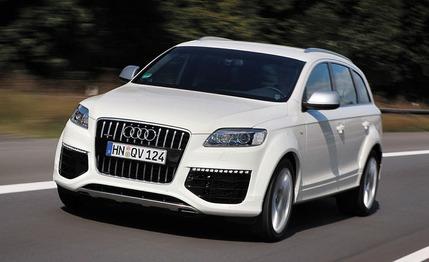 First Drive Review
First Drive Review
Some folks are writing off the diesel. The future, they say, lies in electric vehicles, with hybrids as the transitional technology. Diesel fuel is expensive, they continue, and there is the further popular conception that diesels are not “clean.” In reality, a diesel typically shaves 30 percent off fuel consumption, and diesel fuel savings are even more substantial at high speeds. New technologies make burning diesel as clean as—if not cleaner than—gasoline combustion.
Diesel: Fueling Passion?
It is true that the European market for diesels is still huge, but for most companies and consumers, diesel is a means to achieve fuel efficiency, not fun. There is, however, one company where diesel enthusiasm still reigns: Audi. Allow us to offer as proof Audi’s twin-turbocharged V-12 TDI, packaged into the unabashedly large Q7 SUV. Think of it as Audi’s unconventional response to the Mercedes-Benz ML63 AMG and Porsche Cayenne Turbo S—the latter of which sits on the same platform as the Q7—as well as upcoming M versions of the BMW X5 and X6. In fact, the Q7 V-12 TDI was developed by Audi’s Quattro GmbH high-performance division, and Audi even considered officially dubbing it an RS model.
A diesel-powered Audi RS? The company decided against it so as not to limit this SUV’s appeal, but we wouldn’t have objected. The straight-line performance of the Q7 V-12 TDI is impressive. From 1750 through 3250 rpm (the redline is a low 4500 rpm, typical for a diesel), it delivers an earth-melting 738 pound-feet of torque. The long, flat ceiling of the torque curve suggests that more would easily have been possible, were it not for concerns about the transmission’s durability. Even so, this Q7 uses a strengthened six-speed ZF HP32—the biggest, strongest unit available on the market. Power for the diesel is rated at a flat 500 horsepower.
A Quick, Angry-Sounding Beast
On the road, few cars can keep up. Audi says the 0-to-62-mph sprint takes 5.5 seconds, and—more impressive—112 mph is achieved in 15.7 seconds. These figures, which we haven’t verified with test equipment, seem absolutely credible. Power is instantly available. Push the throttle, and you get treated to an evil growl as the Q7 lurches forward. We were surprised at the elevated sound level. Audi wants it that way, though, and in fact, it’s almost completely designed into the exhaust system. The 6.0-liter V-12 works smoothly and quietly otherwise.
At 155 mph, a governor kicks in. The theoretical top speed is 171 mph in standard configuration, and 176 mph would be possible with minor tweaks. But the cutoff is fine with us, since it is part of a voluntary agreement by the German auto industry that has thus far helped to keep the autobahn unfettered by an overall speed limit. After all, we prefer a real 155 mph to a theoretical 176.
This 6.0-liter V-12 is completely new, but it shares components with Audi’s family of V-6, V-8, and V-10 engines. Audi wants you to believe this engine is derived from that of the Le Mans–winning R10 TDI race car, but there are few commonalities besides the high-pressure common-rail injection system.